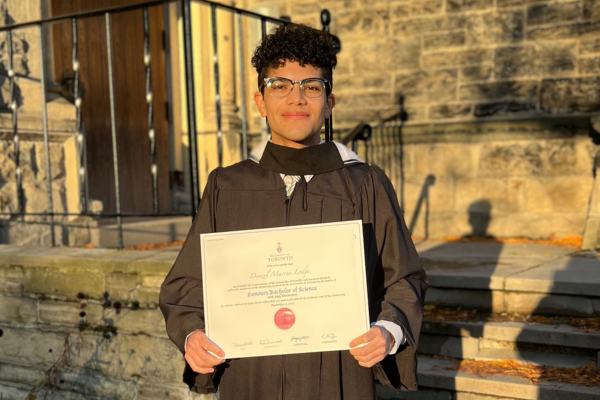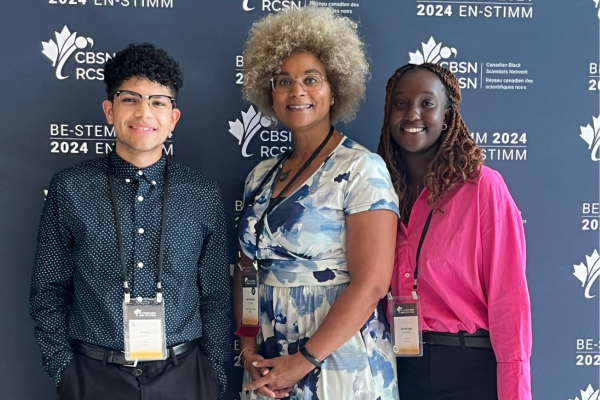U of T master’s student approaches public health with a community-centered lens


Working at Toronto General Hospital during his undergrad, Denzel Lodge received advice that played an integral role in shaping his approach to public health.
The advice came from Istvan Mucsi, an associate professor in the Temerty Faculty of Medicine’s Institute of Medical Science and transplant nephrologist at the hospital, who emphasized that meaningful research cannot be accomplished from a “bird’s eye view” of communities.
“He highlighted that engagement with communities throughout the research process is crucial,” Lodge says.
“Anytime you have the chance to see someone else’s perspectives or needs, it is a gift. Designing interventions with communities allows you to center their needs.”
Lodge is pursuing a master of public health (MPH) in epidemiology at the Dalla Lana School of Public Health (DLSPH), with a Collaborative Specialization in Global Health (CSGH). He joins DLSPH after completing his undergraduate degree in life sciences at U of T Scarborough.
In addition to numerous volunteer positions, Lodge is actively involved in the Canadian Black Scientists Network (CBSN), co-founded by Maydianne Andrade, University Professor in U of T Scarborough’s department of biological sciences, who encouraged Lodge to pursue his master’s at DLSPH.
For him, understanding global health first requires a deeper look at the structures that enable systemic inequities closer to home. Tackling health-care inequities with a holistic, community-centered approach was a large component of his research experience at Toronto General Hospital.
As a clinical research assistant working alongside Mucsi at the Kidney Health Education and Research Group (KHERG), Lodge co-led the Kidney Health for African, Caribbean and Black Communities (KHE-ACB) project. The initiative was born out of the findings of the A.C.T.I.O.N Project, to advance research about ethnocultural barriers to living donor kidney transplantation.
In Canada, ACB patients are 60 to 70 per cent less likely to receive a living donor kidney transplant compared to white patients.
The team designed a website with culturally responsive educational resources to address the disparity and help ACB communities in Ontario make confident decisions about kidney health and disease treatment. It includes information about treatment options, support tips for caregivers and lifestyle changes after surgery. This, for example, included consultations with a dietician to ensure the dietary information provided was culturally relevant.
Project partners included the Black Health Alliance, the TAIBU Community Health Centre and the African Caribbean and Black Organ Health, a YouTube channel and pilot intervention of the A.C.T.I.O.N project dedicated to sharing knowledge about organ transplantation.
“We wanted to be certain our work was not just well-intentioned, but also meaningfully representative of the diversity of Black communities,” says Lodge, who was also a 2023 Summer Undergraduate Research Program (SURP) Award Student with the KHERG.
His experiences in understanding inequities in health-care access made DLSPH perfect for Lodge, who is currently interested in analyzing the distribution of access and outcomes among underserved communities.
CSGH is an educational and training program that offers experiential experience through co-curricular events and practicums, the latter of which Lodge will pursue next summer. Meanwhile, the MPH in epidemiology offers a strong focus on quantitative methods, data analysis, knowledge appraisal and interpretation.
The call towards epidemiology largely stems from his volunteer experience as an undergrad at pop-up COVID-19 vaccination sites, mainly near low socio-economic communities and old age homes in Scarborough. Opened to address inequities in vaccine access, these sites operated with small teams. The experience made Lodge increasingly aware of equity-driven approaches needed to protect those who were at the highest risk of COVID-19 hospitalization.
“I got my first-hand experience of public health in action during one of the biggest public health crises in modern times. I was deeply motivated and inspired working around fiercely dedicated, forthright, collaborative and amazing people,” Lodge says.

Along with his academics, Lodge is dedicated to supporting Black youth retention in STEMM through the CBSN.
Lodge attended the CBSN’s Black Excellence in STEMM (BE-STEMM) conference virtually as a student. Upon graduation, he asked Andrade – one of his mentors – how he could get involved with the network. Since Nov. 2023, he’s been the CBSN’s data and scheduling assistant, working to deliver programming such as its annual Youth Science Fair.
Along with helping to organize the 2024 BE-STEMM conference, which took place this August in Ottawa, he took center stage as a co-moderator for the conference’s panel on public health, interviewing experts on the effects of COVID-19 to maternal health outcomes for Black patients.
The experience left him reinvigorated and supported leading to his master’s.
“It was so meaningful and uplifting,” Lodge says. “Not only was I in the room with some of the most accomplished Black scholars and up-and-coming scholars in the country, I was simultaneously in one of the most welcoming academic environments I had ever been in.”
At DLSPH, Lodge is eagerly learning about various domains of public health and currently enjoying the course, “Introduction to Public Health,” which broadly covers all seven MPH streams. As he thinks about the future, he knows that remaining embedded in communities will be a guiding compass.
“Ultimately, what interests me about global health is that even though we are all connected in our need for quality care, our experiences with health systems can greatly differ. Investigating trends in outcomes can tell us a great deal about power structures and how we think of global health as it exists today,” Lodge says.
“Wherever this journey takes me, I hope to use my education at the DLSPH to bring people together and empower work being done in underserved communities.”







